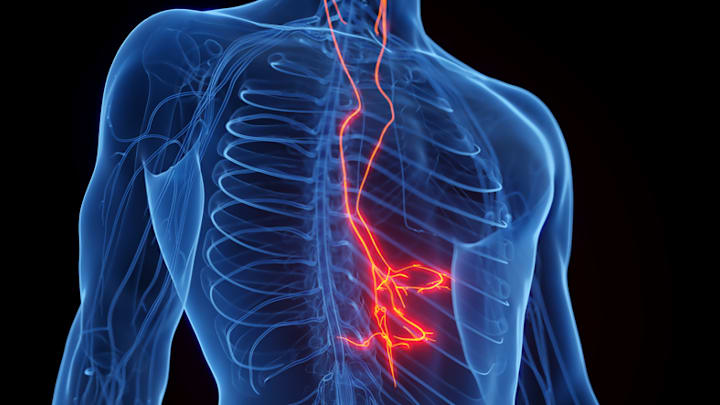The vagus nerve is so named because it “wanders” like a vagabond, sending out sensory fibers from your brainstem to your visceral organs. The longest of the cranial nerves, it controls your inner nerve center—the parasympathetic nervous system. And it oversees a vast range of crucial functions, communicating motor and sensory impulses to every organ in your body. Research in the last decade has revealed that it may also be the missing link to treating chronic inflammation, and the beginning of an exciting new field of treatment for serious, incurable diseases. Here are nine facts about this powerful nerve bundle.
- The vagus nerve prevents inflammation.
- It helps you make memories.
- It tells your lungs to breathe.
- The vagus nerve controls your heart rate.
- It initiates relaxation after stress.
- It lets your gut “talk” to your brain.
- Overstimulation of the vagus nerve is the most common cause of fainting.
- Electrical stimulation of the vagus nerve reduces inflammation and might stop it altogether.
- Vagus nerve stimulation created a new field of medicine.
The vagus nerve prevents inflammation.
A certain amount of inflammation after injury or illness is normal. But an overabundance is linked to many diseases and conditions, from sepsis to the autoimmune condition rheumatoid arthritis. The vagus nerve operates a vast network of fibers stationed like spies around all your organs. When it gets a signal for incipient inflammation—the presence of cytokines or a substance called tumor necrosis factor (TNF)—it alerts the brain and draws out anti-inflammatory neurotransmitters that regulate the body’s immune response.
It helps you make memories.
A University of Virginia study in rats showed that stimulating their vagus nerves strengthened their memory. The action released the neurotransmitter norepinephrine into the amygdala, which consolidated memories. Related studies were done in humans, suggesting promising treatments for conditions like Alzheimer’s disease.
It tells your lungs to breathe.
The neurotransmitter acetylcholine, elicited by the vagus nerve, tells your lungs to breathe. It’s one of the reasons that Botox—often used cosmetically—can be potentially dangerous, because it interrupts your acetylcholine production. You can, however, also stimulate your vagus nerve by doing abdominal breathing or holding your breath for four to eight counts.
The vagus nerve controls your heart rate.
The vagus nerve is responsible for controlling the heart rate via electrical impulses to specialized muscle tissue—the heart’s natural pacemaker—in the right atrium, where acetylcholine release slows the pulse. By measuring the time between your individual heart beats, and then plotting this on a chart over time, doctors can determine your heart rate variability, or HRV. This data can offer clues about the resilience of your heart and vagus nerve.
It initiates relaxation after stress.
When your ever-vigilant sympathetic nervous system revs up the fight or flight responses—pouring the stress hormone cortisol and adrenaline into your body—the vagus nerve tells your body to chill out by releasing acetylcholine. The vagus nerve’s tendrils extend to many organs, acting like fiber-optic cables that send instructions to release enzymes and proteins like prolactin, vasopressin, and oxytocin, which calm you down. People with a stronger vagus response may be more likely to recover more quickly after stress, injury, or illness.
It lets your gut “talk” to your brain.
Your gut uses the vagus nerve like a walkie-talkie to tell your brain how you’re feeling via electric impulses called “action potentials.” Your gut feelings are very real.
Overstimulation of the vagus nerve is the most common cause of fainting.
If you tremble or get queasy at the sight of blood or while getting a flu shot, you’re not weak. You’re experiencing “vagal syncope.” Your body, responding to stress, overstimulates the vagus nerve, causing your blood pressure and heart rate to drop. During extreme syncope, blood flow is restricted to your brain, and you lose consciousness. But most of the time you just have to sit or lie down for the symptoms to subside.
Electrical stimulation of the vagus nerve reduces inflammation and might stop it altogether.
Neurosurgeon Kevin Tracey was the first to show that stimulating the vagus nerve can significantly reduce inflammation. Results on rats were so successful, he reproduced the experiment in humans with stunning results. The creation of implants to stimulate the vagus nerve via electronic implants showed a drastic reduction, and even remission, in rheumatoid arthritis (which has no known cure and is often treated with the toxic drugs), hemorrhagic shock, and other equally serious inflammatory syndromes.
Vagus nerve stimulation created a new field of medicine.
A burgeoning field of medical study, known as bioelectronics, may be the future of medicine. Using implants that deliver electric impulses to various body parts, including the vagus nerve, scientists and doctors hope to treat illness with fewer medications and fewer side effects.
Read More Fascinating Facts About the Human Body:
A version of this story was published in 2021; it has been updated for 2025.
